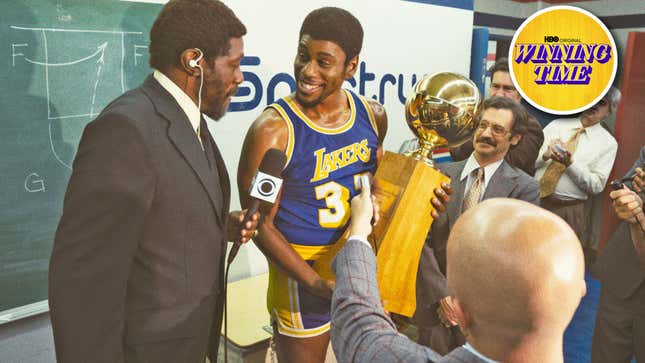
On Monday, the guillotine hovering over HBO’s Winning Time finally dropped when the series joined a growing collection of shows canceled by the network. Declining ratings and criticism from its stars, who insisted that Adam McKay’s Lakers series based on Jeff Pearlman’s biographical account, turned them into caricatures. It also didn’t help that anyone who watched knew where the series was going. Magic’s Lakers and their rivalry with Auerbach and Bird’s Celtics is a well-tread story.
HBO would have better luck serializing some of the most dysfunctional teams in sports history like the Process-era Sixers. The series could get saved by another streaming company, but if it does, it won’t be by HBO. Besides, the formula for HBO’s best dramas in recent years has been scripts based on dysfunctional figures. HBO’s Succession would have been a bore if it were a series about the actual Murdoch family and their perpetually growing media empire. And the real-life players the show centers around hated it: Jerry West demanded a retraction and threatened to file a lawsuit over his portrayal as a foul-mouthed headcase. Kareem Abdul-Jabbar penned a Substack column slamming it as false, shallow, and lazy.
Warner Bros. Discovery’s merger is the sort of dysfunctional drama HBO has been looking for. An overleveraged company led by a bumbling CEO in David Zaslav gutting his company’s media properties. More specifically, Winning Time was only the latest victim of Warner Bros. Discovery’s dismantling of its sports catalog.
In the past few months, WBD has pivoted away from costly sports, late-night, and investigative series quicker than you could watch all 12 episodes of the short-lived Magic Hour. Winning Time joins Bomani Jones’ Game Theory, their revival of Back on the Record with Bob Costas, and the 30-year legacy of Real Sports with Bryant Gumbel on the chopping block. Winning Time’s end signals tough times ahead for the relationship between its parent company and sports programming.
If it looks like WBD’s cost-cutting measures across the board have been extreme, that’s because they have been. Like Jerry Buss in the opening season of Winning Time, Discovery borrowed heavily to accommodate swallowing WarnerMedia whole. Unlike Buss, they’ve been on a cost-cutting spree to reduce $50 billion in debt.
If you don’t think Turner’s parent company would go as far as dropping its NBA deal, think again. Bleacher Report’s footprint has shrunk. One of Zaslav’s first blunders after Discovery and WarnerMedia’s $43 billion merger was appointing Chris Licht to overhaul CNN. Licht’s attempt to push the network further to the right alienated staff and ended in a debacle. The Licht era at CNN was Act I in a calamitous organizational arc. HBO is the domino currently falling, and TNT could be next. Warner Bros’ film division was already an industry joke. Bleacher Report’s footprint has shrunk.
At a time when the NBA is expected to initiate a bidding war with streaming giants, Zaslav set the tone for their exclusive negotiating window with the NBA, which ends in April 2024, by telling investors that WBD “didn’t need the NBA.”
Zaslav later tried to clarify those remarks, but financial realities at Turner’s parent company, as well as recent shakeups at CNN, in the entertainment division, and NBCUniversal’s apparent interest in reclaiming the “NBA on NBC” mantle send signals that change of the worst kind is afoot.
Zaslev’s HBO probably doesn’t recognize Winning Time’s lessons because they’re the Donald Sterling-era corporate Clippers. Watching a media giant fall holds way more dramatic potential than anything the Showtime Lakers could offer.
Follow DJ Dunson on X: @cerebralsportex